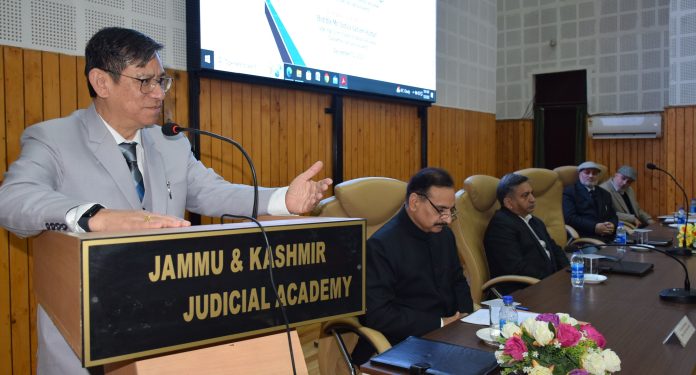SRINAGAR: Jammu & Kashmir Judicial Academy (JKJA) in its endeavour to strengthen the Judicial institutions and impart necessary skills to the judicial officers, organized one day special training programme on ‘Processes & Procedure in Criminal Cases, Cognizance and Trial of Criminal Offences and Maintenance under Cr.P.C’ for Munsiffs of Kashmir province and UT of Ladakh here today.
The programme was conducted under the patronage of Chief Justice, High Court of Jammu & Kashmir and Ladakh, (Patron-in-Chief, JKJA) Justice N. Kotiswar Singh, and guidance of Chairperson, Governing Committee for JKJA, Justice Sanjeev Kumar, and Justice Javed Iqbal Wani, Justice Rahul Bharti, and Justice Moksha Khajuria Kazmi; members of JKJA Governing Committee.
The training programme was inaugurated by Chief Justice, High Court of Jammu & Kashmir and Ladakh, Justice N. Kotiswar Singh Judge in the august presence of Justice Sanjeev Kumar, Judge, High Court of J&K and Ladakh and Chairperson, Governing Committee for JKJA.
Former District & Sessions Judges M.Y Akhoon and Aijaz Ahmad Mir were the resource persons in the programme. The training programme was conducted by Director, J&K Judicial Academy, Y.P. Bourney.
In his inaugural address, the Chief Justice emphasized on the importance of the role played by Judicial Magistrates in the Judicial system, as people come to the magistrates with their grievances and it’s the magistrates who decide whether or not to enter a case in the system which is a very crucial and critical area of the judicial system as the judges sitting at Higher Courts are only supervising authority while as magistrates are the original authors.
The Chief Justice also thanked the resource persons who have themselves been the part of the system for sparing time to enlighten the Magistrates with their vast knowledge and experience.
In his special address, Justice Sanjeev Kumar underlined that the purpose of imparting this training is to enhance the performance of Judicial officers and to remove inhibitions while applying the provisions of law in their day-to-day court work. He also observed that technical session on expediting the trial/disposal of Criminal cases is of great importance because the delay in disposing of the cases is of grave concern for all us associated with the dispensation of justice.
He attributed the delay to the various factors associated with courts, adjournments on the mere asking of lawyers and some factors beyond the control of the Judges. He highlighted that judge- population ratio was far below in our country which was one of the major causes of delaying disposal of the criminal and civil cases.
Justice Sanjeev further stressed upon the judicial officers to inculcate the habit of working with missionary zeal as judicial service is not an ordinary service but a service that needs to be done with mission to ensure that justice is rendered to the person who knocks at the doors of justice, and further articulated that judicial officer should shun the practice of granting unnecessary adjournments. He remarked that the outcome of the workshop would equip the judicial officers to deal with day-to-day problems more effectively and efficiently.
In his welcome address, Director, JKJA extended warm welcome to Chief Justice, Justice N. Kotiswar Singhand to Justice Sanjeev Kumar, Chairperson, Governing Committee for J&K Judicial Academy, , for gracing the occasion and said that by organizing such type of interaction programmes on varied subjects of importance, JKJA provides a platform to the experts and judicial officers to ponder upon crucial issues and exchange valuable experience and knowledge. He hoped that the programme/course would be beneficial for the officers specially to make co-ordinated efforts to achieve the ultimate goal of expeditious and fair trial and justice to the aggrieved parties.
In the first technical session of the programme, M.Y Akhoon guided the participants about the relevant provisions of CrPC related to taking cognizance and committal of criminal cases. The resource person also discussed and deliberated upon the powers of magistrates and trial Courts under section 156(3) and 173(8) of CrPC.
In the second technical session, M.Y Akhoon navigated through process and procedure for private complaints and complaints under Section 138 of Negotiable Instruments Act and also conversed different ways to expedite the trial and disposal of Criminal cases on police report.
Post lunch-session of the programme was chaired by Aijaz Ahmad Mir, who by his vast and varied experience made this part of programme more interesting and absorbing by deliberating upon the important provisions of Domestic Violence Act 2005 and on the Procedure & Practice related to plea-bargaining.
In the Last Session, Aijaz Ahmad Mir discussed with the participants the alternatives to Habeas Corpus petitions vis a vis section 97 of CrPC and the procedure and practice related to section 145 of CrPC.
Later, an interactive session was held during which the participants deliberated and discussed various aspects of the subject topic and raised queries which were addressed satisfactorily by the resource persons.


